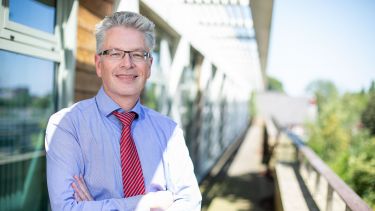Tackling Parkinsonās in Sheffield
Professor Oliver Bandmann from the Sheffield Institute for Translational Neuroscience shares how Parkinson's disease research, treatment and care link up in Sheffield across the University of Sheffield, Sheffield Hospitals, and the people of the city.

āFor almost the last 20 years Iāve been working in Sheffield, as a researcher at the University of Sheffield, and as a consultant with the cityās hospitals. Day to day I am studying Parkinsonās disease and other movement disorders to gain a better understanding of what causes them and how to address them, while also working with patients to help assess and diagnose their condition then assemble a treatment plan.ā
Patient service in Sheffield
āThis is a huge team effort. The Sheffield Teaching Hospitals (STH) provide a multidisciplinary clinical service to Sheffield and the rest of South Yorkshire. Neurologists like myself, geriatricians and specialist nurses work closely together with neurosurgeons, community-based home care teams (including physiotherapists and occupational therapists), speech and language therapists and so many others to provide the best possible holistic care for people with Parkinsonās (PwP) and their families. We also have strong links and work together with local branches of the patient charity Parkinsonās UK, who provide additional support to PwP.ā
How the University and city combine for Parkinsonās research
āOver the years, members of the Universityās Parkinsonās research team have frequently given talks at local Parkinsonās UK branch meetings. I, along with Dr Heather Mortiboys and others, have also helped to organize and contribute to our (SITraN) Open Days and hosted visits to SITraN for PwP groups.
āWe also contributed to other events you might have seen in the city, such as āA Pint of Scienceā, where we explain and talk about our work and the diseases we study in bite (or gulp) sized talks.
āHowever, perhaps the most important connection, is with the many PwP and their spouses who have volunteered as participants for so many of our research projects.ā
The Originality of our research
The research my colleagues and I are conducting into Parkinsonās, and a host of other neurological diseases, truly is at the forefront of medical research anywhere in the world. Meaning the people of Sheffield can be some of the first to feel its benefits.
Professor Oliver Bandmann
Professor of Movement Disorders Neurology
āWe were the first institution worldwide to undertake a drug screen in Parkinsonās disease patient tissue: Rather than using artificial model systems, we took a skin biopsy from people with Parkinsonās, grew the cells in a dish and then assessed 2,000 compounds for their rescue effect on the cell batteries (the mitochondria). This helped us to identify a drug called ursodeoxycholic acid (UDCA) as a very promising drug for Parkinsonās. Our hope is that treatment with UDCA will slow down the worsening of Parkinsonās by rescuing the mitochondria which are often faulty in Parkinsonās.ā
āWe have now taken UDCA into a clinical trial called the UP study. Unique features of this trial includes state-of-the-art functional imaging (31P MR Spectroscopy) and the use of motion sensors to objectively quantify disease progression and how the disease responded to the drug. Some of the Parkinsonās patients included in the UP study are my own patients from Sheffield. Despite Covid, we completed the trial in November last year. We hope to have the study results soon!ā
āIn the future, it will be very important to have the right tools to choose the most promising drug for each individual patient. This is called āPersonalized Medicineā or āPrecision Medicineā, or known technically as ādisease stratificationā. We completed the most extensive tissue-based disease stratification project in Parkinsonās disease. This approach has allowed us to classifyā individual PwP according to the mechanism which caused ātheirā Parkinsonās disease. This will make it easier to put these patients on the right neuroprotective drug in the future! Many Parkinsonās patients from Sheffield and South Yorkshire have helped with these important biomarker studies - and so many of their spouses volunteered as healthy controls!ā
āAll of these collaborations - from the lab, to clinical trials, to working directly with patients - mean what we are doing at Sheffield is very rare. Very few other places are able to deliver this ābench-to-bedsideā approach - weāre doing it!ā
āOur research isnāt in isolation - we know how treatments will be given to patients and how it will impact on their lives because we are doing that too. We are involved in and understand all the stages in treating patients, from detecting the disease, to discovering new drugs, to testing treatments, to delivery in the ward. All of this ultimately means that the treatments we are developing can progress to widespread usage more quickly, and are more targeted to the needs of our Parkinsonās patients.ā
Professor Oliver Bandmann
Professor of Movement Disorders Neurology
Honorary Consultant Neurologist


